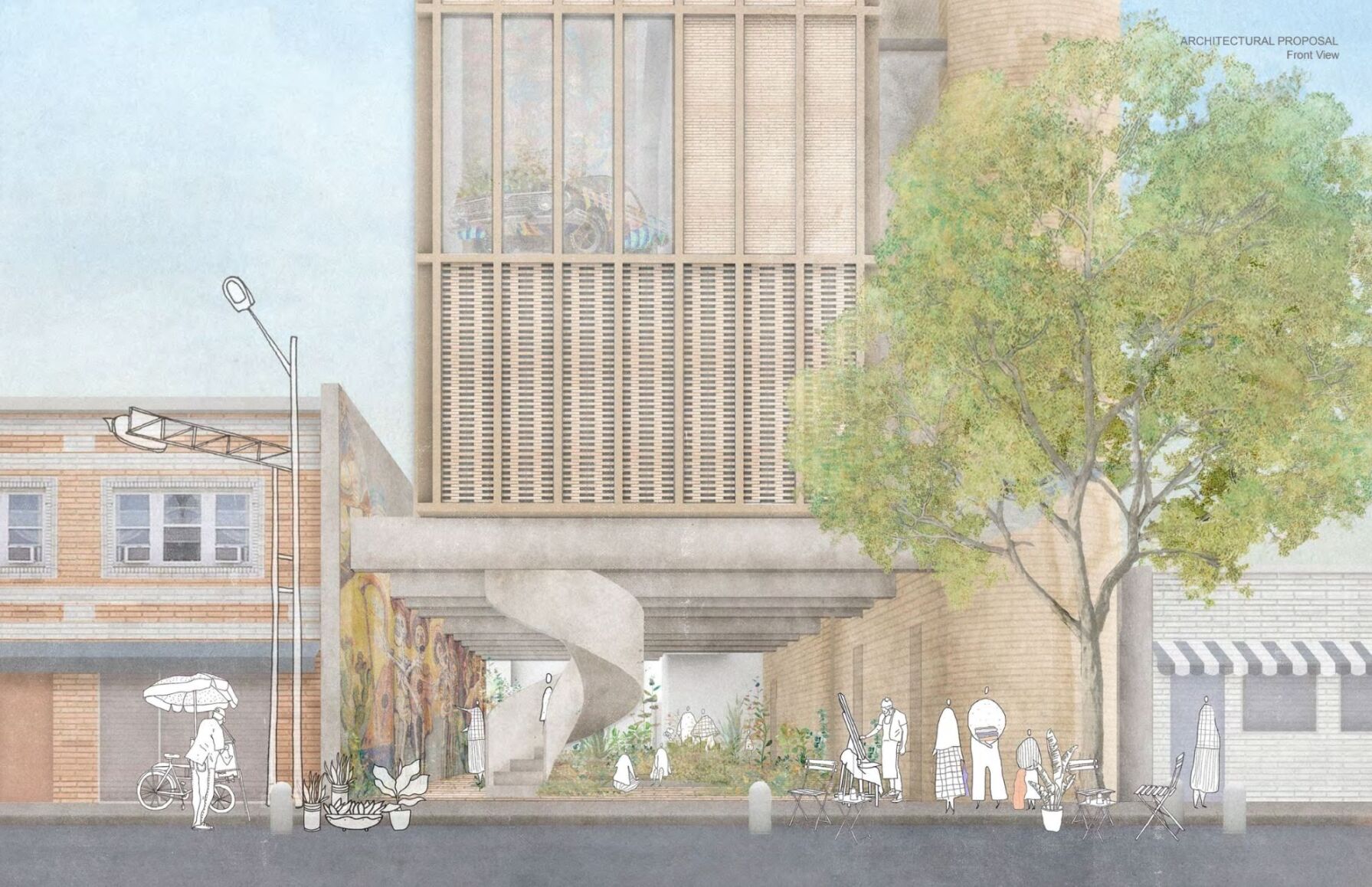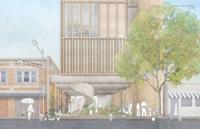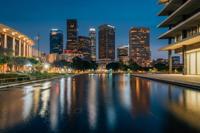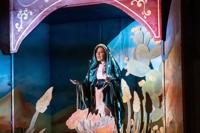
The community of Boyle Heights will soon be home to a new museum focused on elevating Chicano art, history, and voices. The museum, which will be named XOLA, El Museo de Arte Chicano de Los Angeles, hopes to also serve as an innovative spirit of Chicano art that can be a space to build awareness, community, education, and ultimately shape the future generations of Chicanos and Latinos in Los Angeles and Southern California.
Toledo Capital Development LLC submitted an application to the Los Angeles Planning Department in October that would house both XOLA and an affordable housing complex. The building will replace a commercial storefront at 2141 East Cesar Chavez Avenue, formerly known as Brooklyn Avenue.
Alfred Fraijo Jr., land-use attorney at Solmos Group, community organizer, and art enthusiast, initially had the idea to create a museum by and for Chicanos in 2020. Fraijo Jr. was born and raised in Boyle Heights and believes his community has been in need of spaces like XOLA. “There are many art museums in LA and neighboring cities, but many do not showcase and give the importance that Chicano historical and contemporary art deserves,” he said. “We know that art institutions have a lot of work to do in terms of diversity.“
“I've heard from many of our community leaders that we need responsible development," Frajio Jr said. When Frajio Jr reached out to his business partner, Alan Acosta, about the project, he told him he wanted XOLA to be more than a museum; he wanted to create a cultural institution that reflected the values of the Boyle Heights communities.
For Boyle Heights, community gentrification has been an ongoing concern. According to the U.S. Census Reporter, Latinos (referred to in the Census as “Hispanic) make up about 61% of the Boyle Heights population. 23% of the population is below the poverty line (nearly double the rate in California: 12.2%).
Having these alarming numbers in mind, Frajio Jr. knows gaining the community's trust is something he said he is willing to work towards. “I was born in this community, so I’m aware of people’s concerns,” he said. “Because of that,t I believe we need new developments that are conscious and that will center from the inside out as opposed to the outside in. We also need a development that is not extracting value but instead adding and contributing value to these communities.”
Toledo Capital Development was established in 2014. The company's website states that responsible development is the north star of the company. “Responsible development means building projects that adopt an anti-gentrification and anti-displacement stance and embrace beneficial change. Our projects improve place and strengthen existing neighborhood assets,” as stated in their mission statement.
With XOLA, Toledo Capital Development also looks to collaborate with emerging community-based organizations that champion civic engagement and social justice.
The board of directors for XOLA is made up of community organizers, social justice program directors, artist and president of different cultural and health entities in LA.
The 6 board members include Mario Ceballos, Community Health Manager at Kaiser Permanente; Sonja Diaz, Executive Director of the UCLA Latino Policy and Politics Institute; Eddie Martinez, Executive Director of the Latino Equity Alliance and a council member in the City of Huntington Park; Jonathan Muñoz, cultural arts director at the Los Angeles LGBT Center; Roland Palencia, a filmmaker and Community Benefits Director and L.A. Care Health Plan and Michele Siqueiros, President of Campaign for College Opportunity.
In addition to showcasing Chicano art, XOLA would also promote the contemporary work of emerging artists, partner with other arts organizations to promote Chicano art, serve as a community gathering space and create programming for young people and families and bring arts education and training to the neighborhood of Boyle Heights. “I wish I would've had a Chicano art space like this growing up. As a gay man, art spaces really helped me,” Frajio said.
Frajio Jr. grew up in a Latino, mixed-status household with his parents and two older sisters. “My father is a first-generation Mexican-American born in LA. He was a truck driver. My mom is an immigrant from Mexico, specifically Sinaloa, but she grew up in Tijuana,” Fraijo said. “My mom was a housekeeper, and before that, she was a farmworker with my grandmother.”
Frajio attended Theodore Roosevelt High School. During this time, he was also a member of the advisory council for the Eastside’s City Council. He then left for Loyola Law School to become a lawyer.
“I got the incredible benefit of going to college because of their hard work,'' Frajio said.
Frajio explained that the museum is inspired by various traditions and historical events in the 1960s and 1970s that helped shape his own (and other Chicanos) political identity, such as the Zoot Suit riots, the Chavez Ravine injustice, the East L.A. walkouts and the Chicano Moratorium, as well as the racist narratives of the anti-immigration movement.
Julian Bermudez, gallerist and project consultant for XOLA, believes the museum will not only be a place where Chicano art lives but, most importantly, a place where Boyle Heights residents will be able to see the artist in their communities. "I am delighted to be working with the XOLA team on this exciting new cultural institution. Of course, every Southern Californian is better off when great art is shown for all to see,” Bermudez said. “But at XOLA, residents of Boyle Heights will now get to see art made by their people in their own backyard. They’ll get to see and celebrate the rich history, creativity, and living legacy of the Latinx/Chicanx experience."
“Chicanos activists in Los Angeles led many revolutions at that time and art was a big part of this,” Frajio said. “In college, through my teachers, the spaces that I was involved in taught me so much about the rich culture of art. I learned that artists, including queer artists, were the ones that were inspired by generations to stand up, stand proud, and speak out."
Earlier this year, Frajio Jr. launched the Somos Group, a BIPOC-led multidisciplinary law group. "My focus in this group is always connected to my social justice work. We need to think about land and land use as tools for social change. Governmental institutions and private institutions have a direct role in how land is developed, and unfortunately, historically, those decisions did not reflect the needs of underserved communities in Boyle Heights.”
He is a board member of California Harvesters, Inc., Mi Centro LGBT, the UCLA Latino Policy and Politics Initiative, the USC Lusk Center for Real Estate and the Los Angeles LGBT Center. He has also founded organizations such as City Labs Boyle Heights and HONOR PAC.
The Mexican architect Tatiana Bilbao was the building designer, which will sit on top of 0.18 acres with nine floors sheathed in glass and brick and a rooftop deck.
“Los Angeles is home to many impressive art institutions, but most of them are clustered in areas that are far from working-class neighborhoods of color. With Boyle Heights at its core, the XOLA is of and for the comunidad. This effort is a necessary addition to a global metropolis and will uplift the cultural fabric of people who are quintessentially Los Angeles,” Diaz said.
Frajio Jr. said the museum will have free admission for everyone. "It's going to be designed to be free for anybody interested in learning more about Chicano art,” he said. “It will focus on exhibition, multimedia, visual, and narrative types of art. In the future, we also want this space to be used for performances that integrate art and music.
Frajio said he is unsure of when XOLA’s doors will open, as he is still awaiting city approval to start building.










(0) comments
Welcome to the discussion.
Log In
Keep it Clean. Please avoid obscene, vulgar, lewd, racist or sexually-oriented language.
PLEASE TURN OFF YOUR CAPS LOCK.
Don't Threaten. Threats of harming another person will not be tolerated.
Be Truthful. Don't knowingly lie about anyone or anything.
Be Nice. No racism, sexism or any sort of -ism that is degrading to another person.
Be Proactive. Use the 'Report' link on each comment to let us know of abusive posts.
Share with Us. We'd love to hear eyewitness accounts, the history behind an article.